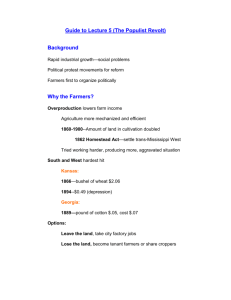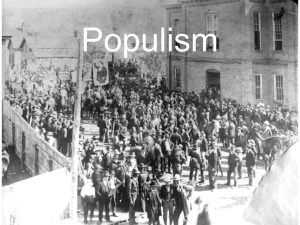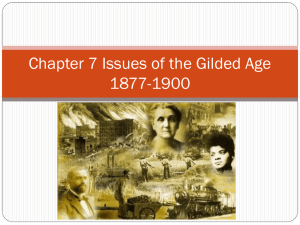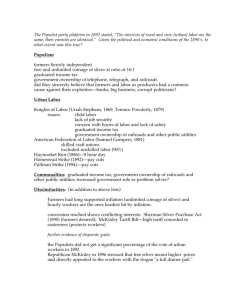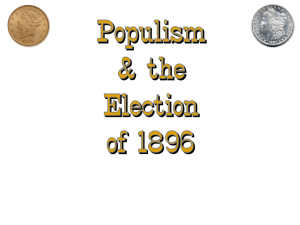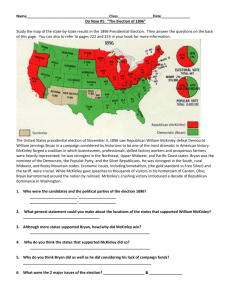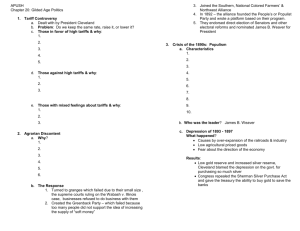PopulismWizardofOz
advertisement
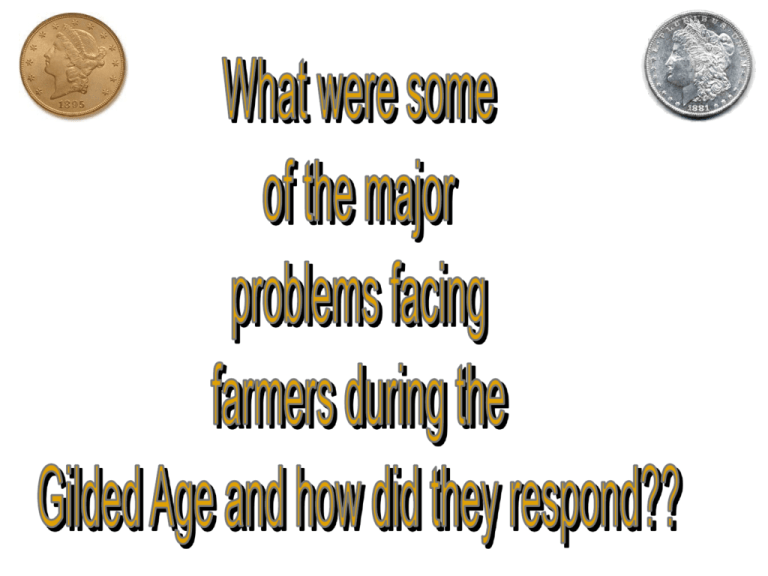
Wanted, dead or alive` Farmers and the Populist Movement: Farmers unite to address their economic problems, giving rise to Populism Economic Distress • Farmers borrow a lot of money to buy new technology, like mechanical reapers and tractors • Farmers buy more land to grow more crops to pay off debts • After Civil War, government takes Greenbacks out of circulation • Debtors have to pay loans in dollars worth more than those borrowed • Prices of crops fall dramatically, deflation • 1870s, debtors push government to put more money in circulation to cause inflation • 1878 Bland-Allison Act-money supply increase not enough for farmers Problems with the Railroads • Lack of competition lets railroads overcharge to transport grain • Farms mortgaged to buy supplies; suppliers charge high interest The Silver Issue “Crime of ’73” demonetization of silver (govt. stopped coining silver). Bland-Allison Act (1878) limited silver coinage to $2-$4 mil. per mo. (based on the 16:1 ratio of silver to gold). Sherman Silver Purchase Act (1890) The US Treasury must purchase $4.5 mil. oz. of silver a month. Govt. deposited most silver in the US Treasury rather than circulation. Farmers Demand the unlimited coinage of Silver!! Bi-Metallism Issue Price Indexes for Consumer & Farm products: 1865-1913 Founder of the National Grange of the Patrons of Husbandry (1867) The Grange Movement First organized in the 1870s in the Midwest, the south, and Texas. Set up cooperative associations. Social and educational components. Succeeded in lobbying for “Granger Laws.” Rapidly declined by the late 1870s. The Farmers Alliances Begun in the late 1880s (Texas first the Southern Alliance; then in the Midwest the Northern Alliance). Built upon the ashes of the Grange. More political and less social than the Grange. Ran candidates for office. Controlled 8 state legislatures & had 47 representatives in Congress during the 1890s. United We Stand, Divided We Fall In 1889 both the Northern and Southern Alliances merged into one—the Farmers’ Alliance. • "What you farmers need to do is raise less corn and more Hell." -Mary Elizabeth Lease, 1890 Platform of Lunacy The Populist (People’s) Party Founded by James B. Weaver and Tom Watson around farmer’s interests. Omaha, NE Convention in July, 1892. Got almost 1 million popular votes. Several Congressional seats won. James B. Weaver, Presidential Candidate & James G. Field, VP Omaha Platform of 1892 1. System of “sub-treasuries.” 2. Abolition of the National Bank. 3. Direct election of Senators. 4. Govt. ownership of RRs, telephone & telegraph companies. 5. Government-operated postal savings banks. 6. Restriction of undesirable immigration. 7. 8-hour work day for government employees. 8. Abolition of the Pinkerton detective agency. 9. Australian secret ballot. 10. Re-monitization of silver. 11. A single term for President & Vice President. Govt.-Owned Companies 1892 Election The Panic of 1893 Here Lies Prosperity Written by a Farmer at the End of the 19c When the banker says he's broke And the merchant’s up in smoke, They forget that it's the farmer who feeds them all. It would put them to the test If the farmer took a rest; Then they'd know that it's the farmer feeds them all. Coxey’s Army, 1894 Jacob Coxey & his “Army of the Commonwealth of Christ.” March on Washington labeled “hayseed socialists!” Demanded the government to create public works jobs for the unemployed Result of Election Returns Populist vote increased by 40% in the bi-election year, 1894. William Jennings Bryan Democrat The “Great Commoner” William Jennings Bryan Revivalist style of oratory. Prairie avenger, mountain lion, Bryan, Bryan, Bryan, Bryan, Gigantic troubadour, speaking like a siege gun, Smashing Plymouth Rock with his boulders from the West. Bryan’s “Cross of Gold” Speech You shall not press down upon the brow of labor this crown of thorns; you shall not crucify mankind upon a cross of gold! Democra tic Party Taken Over by the Agrarian Left Platform tariff reductions; income tax; stricter control of the trusts (esp. RRs); free silver. Bryan: The Farmers Friend (The Mint Ratio) 18,000 miles of campaign “whistle stops.” Gold / Silver Bug Campaign Pins William McKinley Republican Mark Hanna: The “Front-Porch” Campaign HALF A BILLION BACK OF M'KINLEY. The following is a list in part of the members of the Union League Club Committee that has been appointed to provide funds to combat the free silver sentiment. Each man is possessed of great wealth and in control of much more: • NAME: John D. Rockefeller OCCUPATION: Manufacturing WORTH: $125,000,000 • Cornelius Vanderbilt, Railroads 100,000,000 C. P. Huntington, Railroads 60,000,000 J. Pierpont Morgan, Banker 25,000,000 Joseph Milbank, Banker 20,000,000 Andrew Carnegie, Manufacturer 20,000,000 William D. Sloane, Carpets 15,000,000 John Sloane, Carpets 15,000,000 David Dowes, Banker 12,000,000 Herman O. Armour, Provisions 12,000,000 Brayton Ives, Banker 10,000,000 • • • John H. Starin, Transportation 10,000,000 George Bliss, Banker 8,000,000 Samuel Thomas, Contractor 7,500,000 Charles L. Tiffany, Jeweler 7,000,000 LeGrand B. Cannon, Railroads 6,500,000 Henry H. Cook, Financier 6,500,000 . (If the wealth of this committee were converted into metallic money it would absorb all the gold in the United States and about $75,000,000 of the silver.) --Raleigh News and Observer, September 6, 1896, reprinted from New York Journal, 3 August 1896 Are you rich? If yes, how did you get rich? Is somebody else poor because you are rich? Are you rich because somebody else was willing to work while you loafed around? Did you get rich by taking from the man who worked for you four-fifths of all he produced? If yes, is that sort of thing creditable to you? When you started out to get rich why didn't you do it by working yourself? Couldn't you get rich without stealing what another produced? --The Coming Nation, August 1, 1896 The Seasoned Politician vs. The “Young” Newcomer 1896 Election Results Gold Triumphs Over Silver 1900 Gold Standard Act A victory for the forces of conservatism. The End of Populism • McKinley gets East, industrial Midwest; Bryan South, farm Midwest • McKinley elected president; Populism collapses; leaves legacy: – the powerless can organize – agenda of reforms enacted in 20th century by Progressives – Victory for the gold standard and conservatives – Election ends the politics of paralysis and stalemate and leads to the domination of Republican rule until the New Deal coalition of 1932 – Overall, the election showed the emergence and domination of big business, urban America. The Wizard of Oz by L. Frank Baum What Are the Metaphors? Dorothy ? Slippers ? Kansas ? Emerald City ? Wicked Witch of the East ? Oz ? The Wizard ? Munchkins ? Wicked Witch of the West ? Flying Monkeys ? Tinman ? Scarecrow ? Cowardly Lion ? Yellow Brick Road ? Oz = Ounces of Gold The Yellow Brick Road = paved with gold bricks, and leads to D.C. The Emerald City = Washington D.C., the color of money Dorothy’s journey on the Yellow Brick Road Coxey’s March on Washington Dorothy= the common person, a farmer Kansas heart land of the country, populist stronghold The Wicked Witch of the East = Eastern bankers, New York City The Munchkins = subjects, pawns of the eastern banking and industrial interests The Scarecrow = western farmers. They were Populists who could not make money, thus had no brain Tinman= Eastern industrial workers, factory work dehumanized them, they did not have a heart The Cowardly Lion = William Jennings Bryan. Toto = teetotaler The Temperance party. The Wicked Witch of the West = Republicans & William McKinley Monkeys= Plains Indians The Wizard of Oz = Presidents of the Gilded Age, they have no real power, or Mark Hana, the rich business man behind the scenes controlling things. Ruby Red Slippers= They were silver slippers in the book! Money backed by silver will solve the country’s problems. 1. 2. 3. 4. 5. 6. 7. 8. Name one economic problem farmers faced in the late 19th century? What political party was formed (created) to represent the farmers? Did farmers support a money supply backed by gold or gold and silver? Who won the Presidential election of 1896, William McKinley or William Jennings Bryan? What city did the Emerald City represent in the Wizard of Oz? What type of worker did the Tin Man represent in the Wizard of Oz? What was the symbolism behind the Scarecrow not having a brain? In the BOOK, The Wizard of Oz, what color were Dorothy’s shoes? • Analyze the ways in which people organized in the US in response to corporate consolidation and industrialization from 1865-1915. • Analyze how TWO of the following groups responded to the “New Stock” of immigrants in American urban centers from 1865 to 1900 – Reformers – Nativists – Political Machines • Analyze the impact of the following on the American industrial worker between 1865 and 1900. • • • • Government actions Immigration Labor Unions Technological changes • “The period from 1870 to 1900 experienced more conflict than consensus over labor relations.” – Assess the validity of this statement with respect to TWO of the following: • Government • Industrialists • Organized Labor • Choose TWO of the following organizations and explain their strategies for advancing the interest of workers. To what extent were these organizations successful in achieving their objectives? Confine your answer to the period from 1875 to 1925. – Knights of Labor – American Federation of Labor – Socialist Party of America – Industrial Workers of the World • Explain how TWO of the following individuals responded to the economic and social problems created by industrialization during the late nineteenth and early twentieth centuries. – Jane Addams – Andrew Carnegie – Samuel Gompers – Terrance Powderly • Identify and analyze the factors that changed the American city in the second half of the nineteenth century. • How and why did transportation developments spark economic growth during the period from 1860 to 1900 in the United States? Heyday of Western Populism Gift for the Grangers: The Farmer Pays for All! Mark Hanna to Candidate McKinley Into Which Box Will the Voter of ’96 Place His Ballot?
